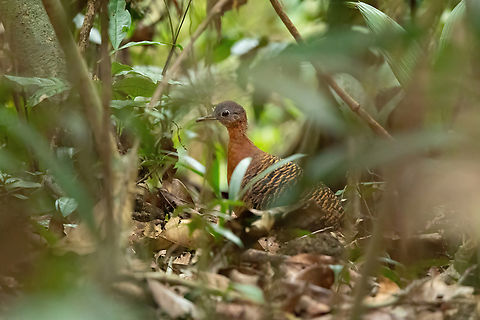
Appearance
The variegated tinamou is approximately 29.5 to 33 cm in length. Its upper back is rufous, and its lower back and wings are black with conspicuous yellowish bands. Its throat is white, and its neck and upper breast are bright rufous, with buff lower breast and belly. Also, its flanks are tinged with cinnamon and dusky light barring. Its crown and sides of head are black with a yellow bill, and greenish to yellowish-brown legs.They have a call that consists of five tremulous evenly pitched notes, sometimes with the notes merging into a trill, although the first note is always distinct and it descends.
Distribution
The variegated tinamou lives in humid lowland forests with dense undergrowth in southern and eastern Colombia, southern Venezuela, French Guiana, Suriname, Guyana, Amazonian Brazil, eastern Peru, eastern Ecuador, and northern Bolivia.Status
The IUCN lists this tinamou as Least Concern, with an occurrence range of 5,400,000 km2.Behavior
Like other tinamous, the variegated eats fruit off the ground or low-lying bushes. They also eat small amounts of invertebrates, flower buds, tender leaves, seeds, and roots. The male incubates the eggs which may come from as many as 4 different females, and then will raise them until they are ready to be on their own, usually 2–3 weeks. The nest is located on the ground in dense brush or between raised root buttresses.Habitat
They prefer to an altitude of 100 to 1,300 m.References:
Some text fragments are auto parsed from Wikipedia.